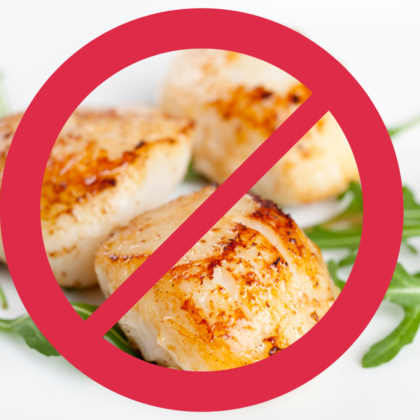Scallops
I don’t like scallops. I’ve tried them. Multiple times. It hasn’t ever been an enjoyable experience.
My partner, Joy, loves scallops. (And she’s given me permission to share this.) It was difficult for her to believe that I don’t enjoy scallops as much as she does. My dislike of scallops somehow diminished her enjoyment.
Joy said, “You should try them at a different restaurant.” So I did. Joy said, “You’re a good cook, you should make scallops.” And Joy thought I prepared them excellently. But I still didn’t like them.
Joy was beside herself. She wanted me to appreciate scallops the way she did. But I just don’t. Then, she realized that if I don’t like scallops, she could have all the scallops. And suddenly it was OK for me to say No to scallops. I felt such relief!
Last Sunday, we talked about having the courage to say No. If we care about building beloved community with one another, we also need to allow space for other people to say No.
That isn’t easy. A lot of times we don’t like it when people say No. When people say No, we push back. We create conflict. In other word, we don’t make it safe to say No.
We might think of conflict as being physical. But conflict can also be subtle. Any time we’re not OK with someone believing, thinking, or feeling differently from us, we’re likely to create conflict.
We might shame people. “I can’t believe you think…” Or “How could you possibly…?”
Maybe we try to persuade someone to see things our way. We start sentences with, “Have you considered…?” Or “Can’t you understand…?” Or “You should try…”
Or we try to catch people. “Aha! But you eat this other seafood… so you must like scallops.”
Or we share our abundant knowledge, believing that if other people had all the same information we have, they would come to the same conclusions we have.
Part of creating space where people can courageously say No means managing our own anxiety. It also takes courage to be vulnerable and accept that other people may experience the world very differently from us. It takes courage to admit that we might not have the one right way of doing, believing, thinking, and feeling.
That uncertainty can be scary. But being vulnerable also opens the way to deeper connection. Because if I can’t safely say No, my Yes doesn’t really mean much. It may mean that I’m compliant. Or that I want to avoid conflict as much as possible. Or that I want you to like me.
Whatever it might mean, if I can’t say No, you can’t trust that my Yes is sincere.
If I can say No, then my Yes becomes a lot more meaningful.
Courage works both ways in community: We have to be courageous to say No, and we have to be courageous to hear No and not push back or create conflict.
Where in your life could you allow more space for other people to say No?
Share this post:
